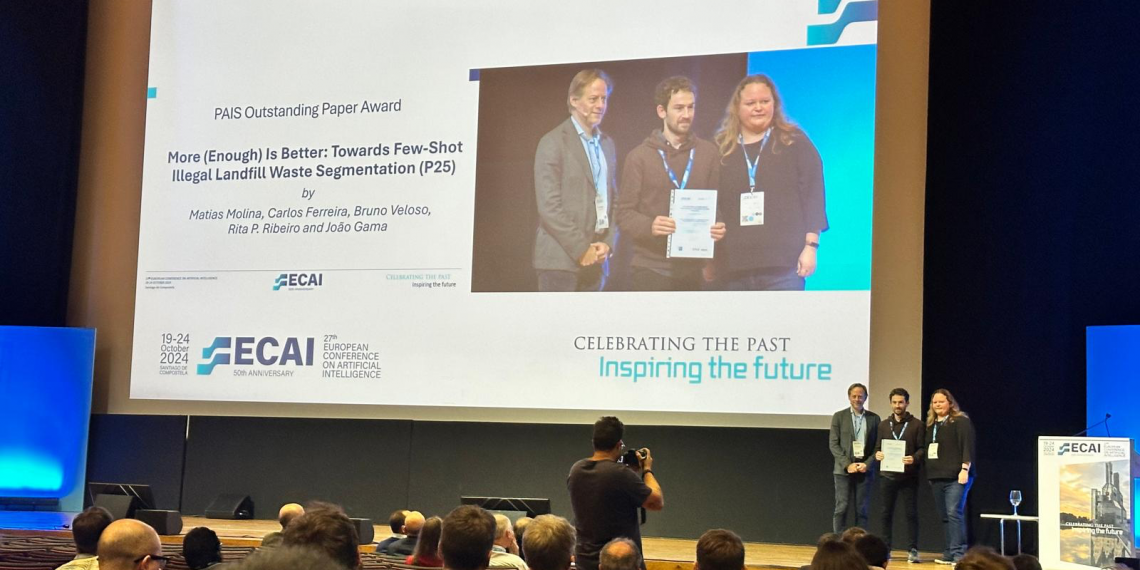Matías Molina, INESC TEC researcher in Artificial Intelligence, received the PAIS Outstanding Paper Award at the European Conference on Artificial Intelligence, one of the most relevant AI events in Europe and the world. The EMERITUS project was the basis for this work: INESC TEC is using AI to improve the investigation of environmental crimes.
The publication “More (Enough) Is Better: Towards Few-Shot Illegal Landfill Waste Segmentation” focuses on image segmentation to detect waste in illegal landfills – resorting to aerial images. According to the INESC TEC researcher, this is a “vital task for the effective monitoring of environmental crimes”. The work, published by IOS Press in the series “Frontiers in Artificial Intelligence and Applications”, is available in open access.
Matías Molina, first author of the work developed with INESC TEC researchers Bruno Veloso, Carlos Abreu Ferreira, Rita Ribeiro and João Gama, explained that “we faced a great challenge in preparing this work, since there is a great scarcity of annotated data, which brings a series of difficulties in locating and identifying illegal landfills.”
This paper introduces a series of new contributions in the area, namely regarding advances in segmentation with fewer data, the combination of classification and segmentation methods to improve the accuracy of waste detection, and advanced evaluation metrics.
“This paper contributes to the field of AI by applying few-shot learning techniques, which allow the segmentation of illegal waste with a reduced number of annotated images. This represents a significant advance, since, as I mentioned earlier, obtaining data for illegal landfills is often limited and very expensive,” stated Matías Molina.
In this work, the INESC TEC researchers introduced advanced evaluation metrics, like Intersection over Union (IoU), besides combining classification models with segmentation techniques. According to Matías Molina “we made evaluations with different metrics, after combining some of them to understand which one meets the challenges of environmental monitoring, according to the requirements that had been defined by the EMERITUS project.” By using various metrics, the researchers were able to better understand how to measure the quality of project outcomes.
“The work we are developing in the EMERITUS project – with this paper as one of the main results – brings not only several contributions in terms of science, but also at the societal level, where we can highlight a positive environmental impact, greater efficiency in waste monitoring and greater awareness and support in the definition of new public policies,” said the INESC TEC researcher.
By improving the detection of illegal landfills, the study facilitates the identification and monitoring of environmental crimes, which is crucial to protect the environment and tackle illegal waste-disposal practices that harm ecosystems and public health.
The use of few-shot learning will allow authorities to identify illegal landfills, without the need for large databases, which makes the environmental monitoring process not only more accessible, but also less expensive. It will also allow the more democratised access to this type of solutions, by being available to organisations or even government institutions with more limited resources.
“Although there are still several challenges, our findings suggest that combining advanced AI techniques with the collection of specific data can improve the performance of illegal landfill waste detection. To overcome these challenges, our research team at INESC TEC recommends further refinement of specific representation models to better characterise landfills,” concluded Matías Molina.
INESC TEC’s work has been contributing with valuable knowledge and methodologies to the EMERITUS project, supporting ongoing efforts in the monitoring of environmental crimes.
The researchers mentioned in this news piece are associated with INESC TEC, UP-FEP, UP-FCUP and IPP-ISEP.


 News, current topics, curiosities and so much more about INESC TEC and its community!
News, current topics, curiosities and so much more about INESC TEC and its community!